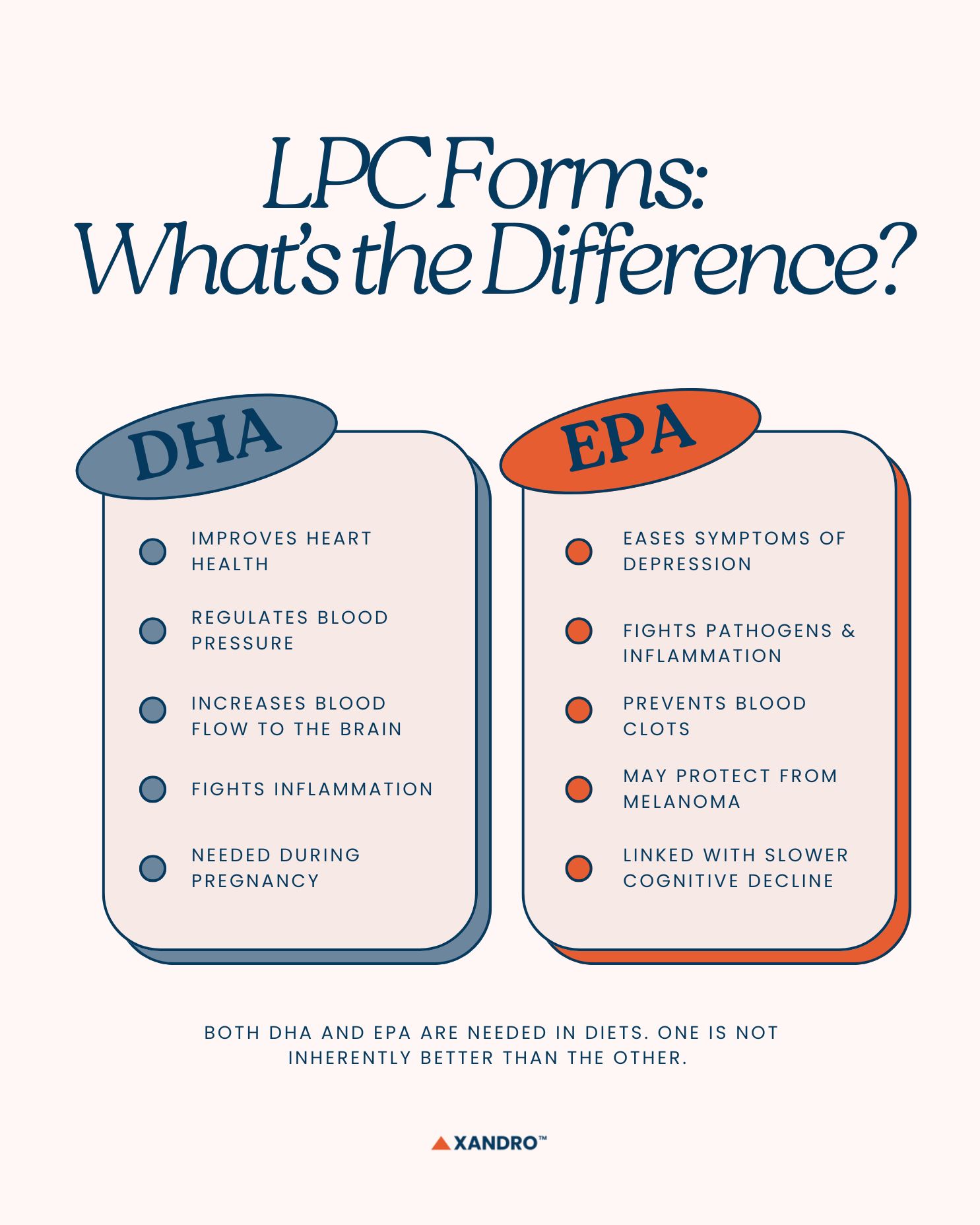LPC DHA vs EPA: Benefits, Brain Health, Supplements and Sources
18th Dec 2024
LPC DHA vs EPA: The Best Choice for Brain Health and Supplements
Omega-3s are incredibly important for our health; from building brain cells, keeping your heart healthy, reducing inflammation and lowering blood pressure to giving you energy, there are a plethora of reasons why we need to get omega-3 into our diets, which is why many turn to omega-3 supplements.
Did you know that standard omega-3 supplements don’t actually provide EPA and DHA to the brain? This is because they can’t cross into the brain, but recent developments have changed that — in the form of LPC omega-3, known as LPC DHA and LPC EPA, which this blog will discuss.
Know what you’re looking for? Jump there now:
- What is LPC DHA?
- What is LPC EPA?
- What is the Difference Between DHA and EPA?
- LPC and the Brain
- Where Can I Buy LPC DHA?
To begin with, what is DHA? Docosahexaenoic acid, or DHA, is one of the three essential omega-3 fatty acids. It’s found in high concentrations in the brain and is needed for brain function.
This omega-3 improves several markers of heart health, possibly even more so than EPA, increases blood flow to the brain, which may improveADHD symptoms, may help prevent or slow Alzheimer’s Disease, fight inflammation, meaning it may reduce muscle soreness after exercise, regulates blood pressure and may reduce cancer risk. It’s also incredibly important for the development of the eyes and brain during pregnancy.
The difference between LPC DHA and DHA
Lysophosphatidylcholine DHA, or LPC DHA, is simply where DHA is combined with a lipid carrier to transport it into the brain and eyes. It needs this because when combined with LPC, DHA can cross the blood-brain barrier to actually increase levels in these areas. Without LPC, DHA wouldn’t cross into the brain and eyes, meaning standard omega-3 supplements don’t actually do much.
What are the sources of LPC DHA?
While DHA can be found in oily fish like salmon, mackerel and anchovies, LPC DHA can be consumed by eating raw fish, fish roe, krill, salmon, scallops and mackerel. You can also take supplements, such as the Lysoveta® supplement, LPC Neuro, which crosses into the brain and restores DHA to combat age-related cognitive decline.
So, what about EPA? Eicosapentaenoic acid, or EPA, is another of the omega-3 fatty acids, found in cold-water fatty fish, such as salmon and tuna. EPA helps prevent your blood from clotting easily, reduces pain and swelling and reduces triglycerides, a type of fat your body uses for energy or stores in fat cells, levels in the blood.
EPA may also help with depression and anxiety and brain and cardiovascular health, as well as may help protect the skin from melanoma. High EPA levels have been linked with slower cognitive decline and a lower risk of dementia.
The difference between LPC EPA and EPA
Like LPC DHA, LPC EPA turns EPA into a lysophospholipid form that can increase the amount of EPA in the brain. This is because by crossing the blood-brain barrier through the transporter, MFSD2A, the brain and eyes can then absorb the EPA.
Most omega-3 supplements will combine DHA and EPA for their great properties, but what are the difference between the two?
Other than what’s mentioned above, DHA is used by many hormones that stop your body’s inflammatory response. On the other hand, EPA helps by producing eicosanoids that help fight inflammation. In the liver, EPA can be converted into DHA.
EPA may help symptoms of depression and fight against pathogens more than DHA, while DHA supports blood pressure regulation better than EPA and is crucial if you’re pregnant. Both are needed in all diets.
Learn more about why omega-3 fatty acids are needed for your health.

Which is better for the brain, EPA or DHA?
So, is EPA or DHA better for the brain? Both are needed for various functions, but DHA is generally considered the better of the two for the brain. This is because DHA makes up 97 per cent of omega-3 fatty acids in the brain and is needed in cell signalling, to form new brain connections and maintain the overall brain structure.
As mentioned, DHA is needed for cognitive function, memory and motor speed, helps with blood flow during mental tasks and is needed for the development of the brain and then maintenance of the brain as we age.
Does DHA increase brain size?
It’s not just DHA that has been found to do this. High omega-3 levels have been linked to a larger total brain volume as well as larger grey matter, or neuronal cell bodies and dendrites, volumes in regions of the brain. Grey matter is responsible for processing information, whether it be sensation, learning, speech, perception or cognition.
If you’re looking for the best LPC DHA supplement, why not try LPC Neuro? Made with Lysoveta™ Aker Biomarine, this Lysoveta™ supplement is an advanced omega-3 supplement that allows the brain to absorb DHA and EPA and build up levels, which is needed since our brain’s access to these decline as we age.
This omega-3 supplement made with oil extracted from krill targets brain support for sharper memory and improved focus and restores and replenishes neurons.
You can learn all about this Lysoveta™ supplement here.
End Note
With LPC omega-3s and LPC Neuro, you can provide your body with the right kind of omega-3s for scientifically proven brain and cognitive support.
You can learn more about how to support your brain health and longevity by reading through Xandro’s blogs. Keeping yourself informed and healthy is your way to a longer health span.
Science First. Trusted Longevity Solutions.
